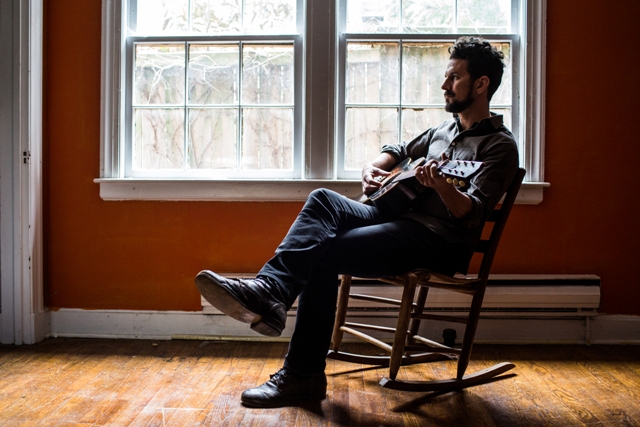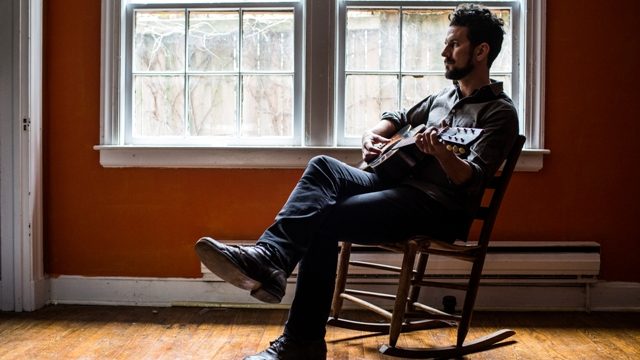By Jim Morrison
Gill Landry. Roll that around. Pause, ponder.
Yes, Gill Landry is a longtime member of Old Crow Medicine Show. But the New Orleans resident also has a jagged solo career, releasing three albums, including his latest meditation, “Gill Landry,” last year.
And, according to his bio, he’s a fine roadside photographer, a self-taught painter, a shade tree mechanic, and a rubber tramp gentleman.
For now, we’ll concentrate on the music. His solo work finds him treading more along the Bob Dylan, Townes Van Zandt, Steve Earle, and Lucinda Williams songwriting line. The songs on “Gill Landry” taking unblinking looks at life and relationships.
“I tried not to come at this one from the point of how things could or should have been, or should be, but rather searched for sweet understanding and surrender to what is or was, and moving forward with compassion and kindness without harsh judgment to the reasons for this crime or that misstep,” he says.
Landry, who was not available for an interview, appears at Bayou Boogaloo Music and Cajun Food Festival on Saturday, June 25, one of several festivals he’s playing this summer.
He recorded his latest in a ramshackle apartment on the south side of Nashville. But he persuaded a list of A-listers to join him. Laura Marling duets on “Take This Body,” perhaps the album’s best cut. Nick Etwell of Mumford & Sons shows up. Odessa lends harmonies and violin. Robert Ellis plays guitar.
The tunes have a loping, slow-emerging back porch feel to them in contrast to the high energy of an Old Crow set. Landry’s voice is soft, worn, corduroy, the perfect centerpiece.
“Broken down / Hung up and wasted in an artless town / Thinkin’ of old loves and wedding gowns / Passing time,” Landry croons on the lead single “Just Like You.”
Landry grew up playing music. “I got my first guitar when I was five. I was inspired by my uncle who was married to a woman from Holland. They used to sit around and play Fleetwood Mac songs and he was really into Bruce Springsteen. I believe that Born In The U.S.A was my first cassette,” he told an interviewer. “He used to dub me lots of tapes of what he was into, but I was too young to get most of it. The first tapes I bought for myself was License to Ill by the Beastie Boys and Raisin’ Hell by RUN DMC, which was also my first performance. I lip synced “My Adidas” with my friend Bobby Shaw at an elementary school talent show.”
Landry played in a band called The Kitchen Syncopators. He met the guys in Old Crow in New Orleans in 2000.
“We were both busking over Mardi Gras. We’d been on a similar path: both of our bands started at the same time, but on different coasts. We were each studying the same songs and music. We were even performing a lot of the same songs<‘ he said. “They were doing them more as old-time string band numbers, while we did them with more of a New Orleans country blues and ragtime vibe. I didn’t join them until four years later, when Critter quit and they were looking for someone to fill in. Our mutual friend, Sam Parton, suggested I give Ketch a call. So, I did, and he said that he thought I could be the guy. He asked me how my clawhammer and dobro playing was, and I said it was “rusty but good.” I didn’t even own a banjo at the time and hadn’t heard of “clawhammer” before. I was a guitar player.”
Landry bought a banjo in Seattle and practiced for two weeks before meeting the band. “I played it on the Opry and at Doc Watson days,” he said. “I must have just been god awful.”
Landry says his solo work has little connection to his Old Crow work. “They’re two separate things. They are completely different ways of approaching recording. I learned a lot working with Old Crow, but I wouldn’t say it influenced how I work on my own records, most likely because I had worked on many of my own records before I ever recorded with Old Crow,” he explained. “Old Crow tries to get everything in one take, which is exactly what I did with the Syncopators, but for my own records, it was whatever got the results I wanted.”
Getting back to solo work proved satisfying. “There is no one to lean on,” he said. “It is a tremendous amount of power and it is a lot more work. I believe in the songs and myself as a writer. ”
“It reminds me each time, and certainly this time, of different aspects of who I am. When you take on something big, it reveals your strengths and weaknesses,” he added. “All the fears come to the surface, but you power through. At the end of the day, you play some music and it’s great.”





